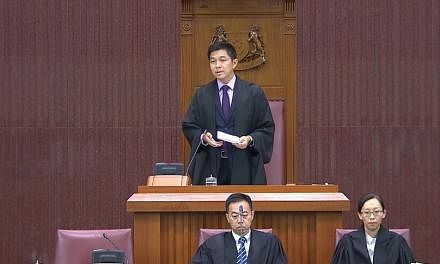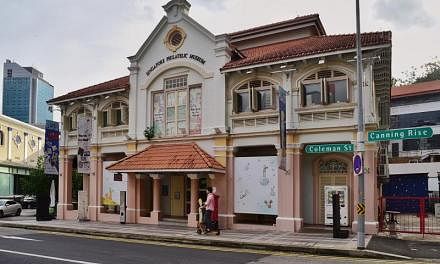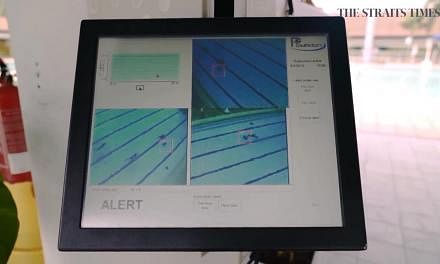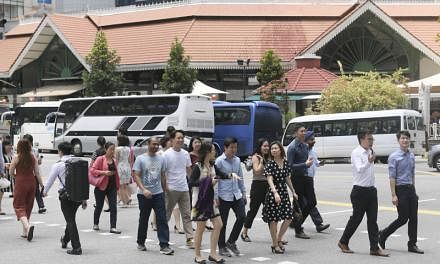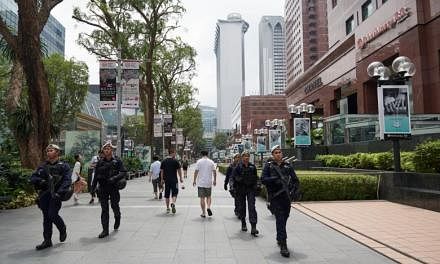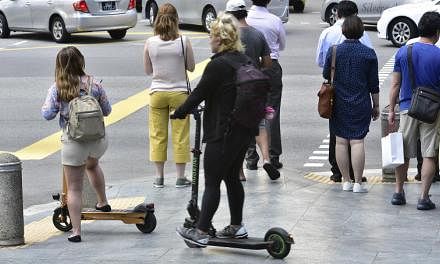SINGAPORE - If this year's Budget goodies were part of a "cynical election scheme", the $6.1 billion Merdeka Generation Package would never have been budgeted for, said Speaker of the House Tan Chuan-Jin on Friday (March 8).
Rounding up the nine-day marathon debate on the national Budget, Mr Tan said: "We would have shifted the burden to the future. That's what most governments do, because the monies can be spent to make all of us happier in so many different ways."
Referring to how the Government stresses prudence and trade-offs, he added: "Which government in the world would embark on this when they have funds and reserves to do so many more things to keep the electorate happy? But that is not the way we are."
Mr Tan was making a larger point about how Singapore, unlike many countries, plans for the long term when it allocates resources.
Around the world, some systems are "running from pillar to post, from one election cycle to another" because the government's focus is on being elected in the present, he noted.
Instead of long-term investments in public infrastructure, such governments tend to spend money on initiatives which people respond to at the polls.
And in corrupt systems, projects are started so that leaders can "cream off the kickbacks" and make what they can "because... you don't know how long you're going to be there".
But Singapore, Mr Tan said, is different. It plans for both the present and the future, and in the process grapples with the difficult challenges and trade-offs that must be made.
In this year's debate, about 500 speeches were made and questions were asked on a range of topics, including Singapore's diplomatic relations, its physical security and cyber security.
A hot topic was streaming in secondary schools, which was finally laid to rest when Education Minister Ong Ye Kung announced it would be phased out in 2024.
Mr Tan said: "Many supported the slaughtering of this particular sacred cow, including, surprisingly, Mr Louis Ng. (Mr Ng, a vegetarian, is an animal rights advocate).
"Now it sounds exciting but actually, it may be quite disastrous if we do not understand why the cow was put out to pasture in the first place. Streaming changes, I think, are much welcomed but as (Education) Minister Ong Ye Kung explained, there was a reason for that cow."
He added: "While every cow is a good cow, no cow is perfect. There are sometimes unintended consequences. Because over the years, we have learnt that it emits methane gas and so, therefore, it impacts the environment. So over the years, as he has shared, we have sought to trim the cow, adjust its diet, sliced off its rump, have a little barbecue, its flanks... and finally we lay it to rest."
He continued: "It's a far less dramatic story, but I think a more accurate one and a recognition of the work done by many to get to where we are today.
"I know that the slaying of sacred cows sounds bold, it sounds daring, even romantic perhaps. Dramatic changes always seem exciting. But I think it's useful for us to also remember with a sense of perspective that that is not the objective. Change is not the purpose. Better outcomes are."
Leader of the House Grace Fu also noted that the social ministries received a record high number of questions, with MPs focusing on educating and training Singaporeans for the future, as well as caring for the aged and vulnerable.
The Ministry of Culture, Community and Youth - of which Ms Fu is Minister - received the highest number of such questions, and the time MPs spent speaking on the topic was the longest.
Ms Fu said in her own Budget round-up that the past nine days of robust debate have seen MPs come to agreement on three things.
First, that Singaporeans need to be at the heart of government policies. This means that workers must not be left behind in the pursuit of economic progress, she said. It also means improving access to affordable healthcare and helping children build strong foundations in education.
"With Singaporeans at the core of our policy considerations, we did not shy away from making major changes like removing streaming in secondary schools," she added.
Next, that Singapore must "keep an eye on the future" even as it works on the present. This means taking advantage of technology to keep Singapore competitive and make sure critical functions are not affected by the country's shrinking population. Also, it need to maintain fiscal prudence and find "the next water story" in waste and food.
Lastly, the Government can arrive at effective solutions if it gives space for civic participation in policies and implementing of plans.
Ms Fu thanked the House for "coming together to weave strategies to build a stronger fabric for a united Singapore", making special mention of the nine Nominated MPs who were appointed in September 2018 and attending their first debate on the Budget.
"They have researched, studied and presented their case with robustness. Their contributions have enriched the debate," she said.


